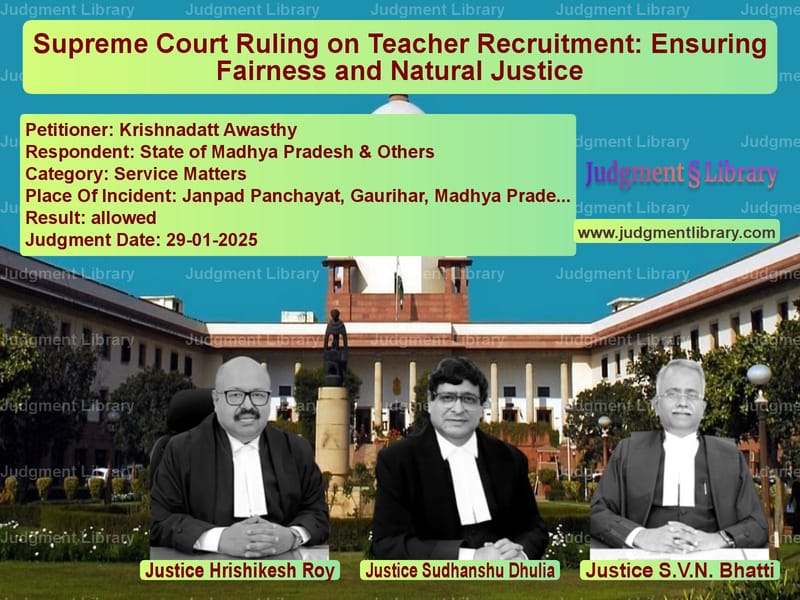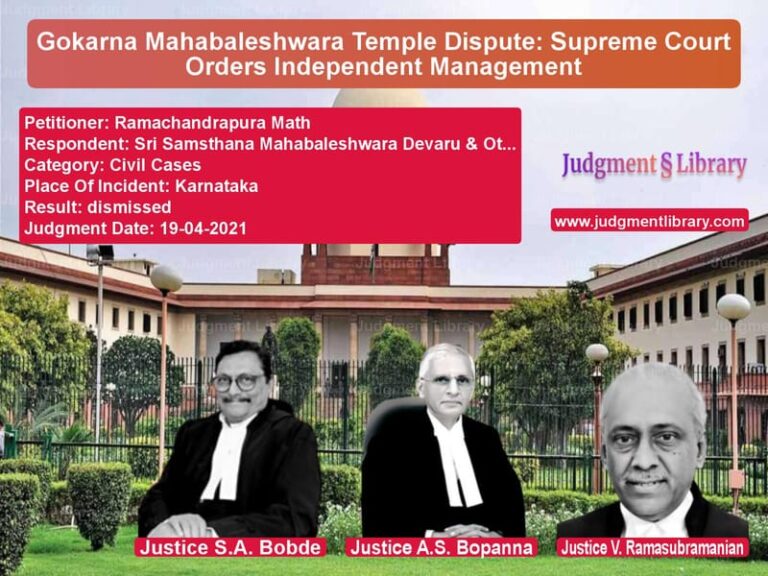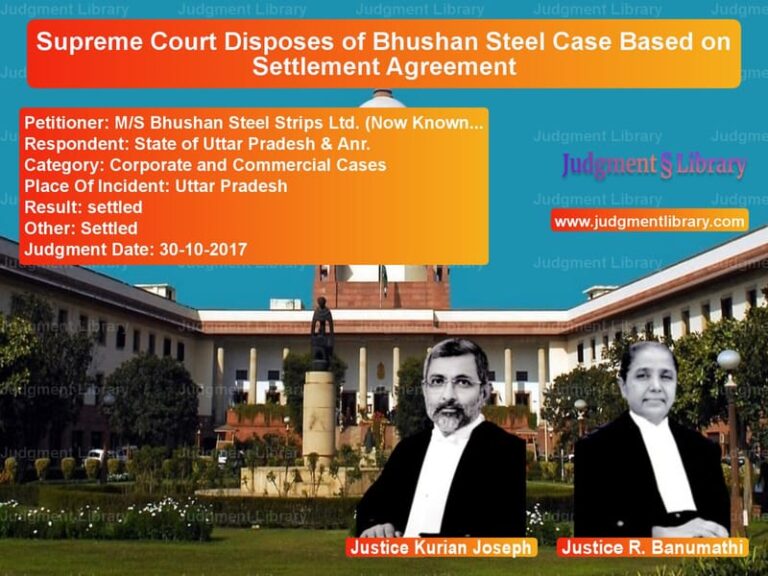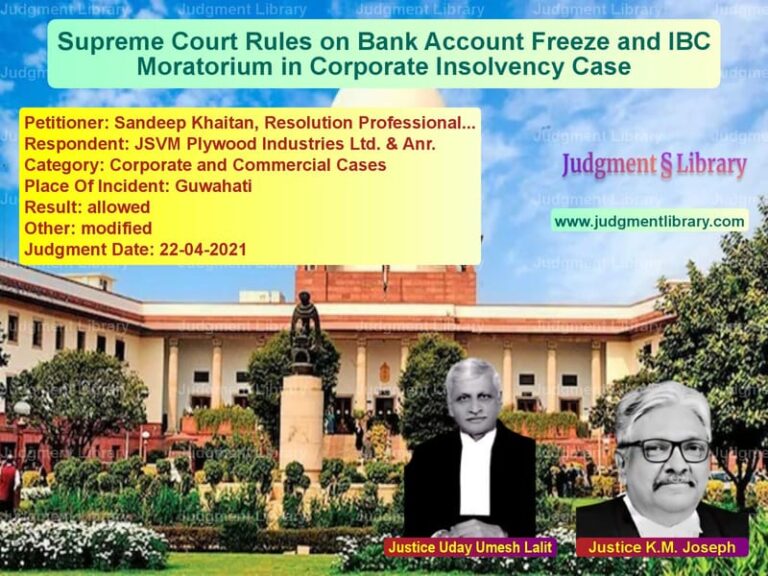Supreme Court Ruling on Teacher Recruitment: Ensuring Fairness and Natural Justice
The Supreme Court of India, in a landmark judgment, addressed the critical issue of fairness in recruitment processes for public positions. The case of Krishnadatt Awasthy v. State of Madhya Pradesh & Others revolved around the selection process for Shiksha Karmi Grade III teachers in Janpad Panchayat, Gaurihar, Madhya Pradesh, in 1998. The ruling has far-reaching implications, especially in the context of administrative fairness, bias in selection committees, and the right to a fair hearing.
This case presented a conflict between two fundamental principles of natural justice— rule against bias and right to a fair hearing. The judgment was delivered by a larger Bench after a split verdict was initially given by two judges, necessitating a deeper legal examination.
Background of the Case
The case arose when an unsuccessful candidate, Archana Mishra, challenged the appointments made in the 1998 selection process, alleging nepotism and bias in the selection process. The Collector, upon review, set aside the appointments without providing an opportunity of hearing to the selected candidates. This decision was upheld by the Commissioner and later by the Madhya Pradesh High Court.
The affected candidates, led by Krishnadatt Awasthy, appealed to the Supreme Court, arguing that the entire selection process was annulled without following the principles of natural justice, thereby violating their fundamental rights.
Key Legal Issues
The Supreme Court had to determine:
- Whether the selection process was vitiated due to violation of the rule against bias.
- Whether the failure to provide a hearing to affected candidates amounted to a breach of audi alteram partem.
- Whether the denial of natural justice at the initial stage could be cured at an appellate stage.
Arguments of the Parties
Petitioners’ Arguments
Senior Advocate Vivek Tankha, representing the appellants, put forth the following arguments:
- The selection committee members who were related to certain candidates had recused themselves from evaluating their relatives and did not influence the selection process.
- The Collector’s decision to cancel the appointments was taken without granting the selected candidates an opportunity of hearing, violating the core principle of natural justice.
- Allegations of bias were based on incorrect assumptions, and the merit of the selected candidates was ignored.
- The selectees were not given a chance to demonstrate that their selection was based on fair criteria and not on favoritism.
Respondents’ Arguments
The respondents, represented by Advocates Mrinal Gopal Elker and Avdhesh Kumar Singh, defended the Collector’s decision on the following grounds:
- The presence of close relatives in the selection committee created a conflict of interest and violated Section 40(c) of the Panchayat Raj Act.
- The selection committee’s independence was compromised, as some of its members had a direct relationship with certain candidates.
- The breach of natural justice, if any, was cured at the revisional stage, where the affected candidates were given an opportunity to defend themselves.
- Higher marks were awarded in interviews to the selected candidates due to favoritism.
Key Observations and Judgment
Justice KV Vishwanathan’s Opinion
Justice Vishwanathan ruled in favor of the appellants, emphasizing the importance of the right to a fair hearing. His judgment stated:
“The ex-parte decision to set aside the selection stands vitiated. Since the candidates were not made parties and were not given a chance to defend their selection, the entire process was flawed.”
He highlighted that Rule 9 of the Appeal and Revision Rules, 1995, required that selected candidates be given an opportunity to present their case, which was not followed.
Justice JK Maheshwari’s Opinion
Conversely, Justice Maheshwari upheld the cancellation of appointments, emphasizing the principle of rule against bias. He noted:
“When the degree of relationship is in quite proximity, bias has to be inferred. The selection process was tainted, and no fresh hearing was necessary.”
Final Verdict
The majority opinion, delivered by Justice Hrishikesh Roy, Justice Sudhanshu Dhulia, and Justice S.V.N. Bhatti, ruled in favor of the appellants. The Court held:
“An allegation of bias can only be proved if facts are established after giving an opportunity of hearing. The principles of natural justice require that no person should be condemned unheard.”
The Court reinstated the appointments and ruled that after 25 years of service, a fresh inquiry would be impractical.
Legal Precedents and Impact
The Court referred to several precedents, including:
- Maneka Gandhi v. Union of India (1978): Reinforced the importance of procedural fairness.
- State Bank of Patiala v. S.K. Sharma (1996): Distinguished between “no opportunity” and “inadequate opportunity.”
- A.K. Kraipak v. Union of India (1969): Held that the presence of interested parties in the selection process can create a reasonable likelihood of bias.
Conclusion
The Supreme Court’s ruling in Krishnadatt Awasthy v. State of Madhya Pradesh & Others sets a crucial precedent in administrative law. It reaffirms that procedural fairness cannot be an afterthought and that affected individuals must be given a fair opportunity to defend themselves.
This judgment will serve as a guiding principle for future cases related to employment disputes, ensuring that fairness and transparency remain at the core of public recruitment processes.
Petitioner Name: Krishnadatt Awasthy.Respondent Name: State of Madhya Pradesh & Others.Judgment By: Justice Hrishikesh Roy, Justice Sudhanshu Dhulia, Justice S.V.N. Bhatti.Place Of Incident: Janpad Panchayat, Gaurihar, Madhya Pradesh.Judgment Date: 29-01-2025.
Don’t miss out on the full details! Download the complete judgment in PDF format below and gain valuable insights instantly!
Download Judgment: krishnadatt-awasthy-vs-state-of-madhya-prad-supreme-court-of-india-judgment-dated-29-01-2025.pdf
Directly Download Judgment: Directly download this Judgment
See all petitions in Employment Disputes
See all petitions in Recruitment Policies
See all petitions in Public Sector Employees
See all petitions in Judgment by Hrishikesh Roy
See all petitions in Judgment by Sudhanshu Dhulia
See all petitions in Judgment by S.V.N. Bhatti
See all petitions in allowed
See all petitions in supreme court of India judgments January 2025
See all petitions in 2025 judgments
See all posts in Service Matters Category
See all allowed petitions in Service Matters Category
See all Dismissed petitions in Service Matters Category
See all partially allowed petitions in Service Matters Category







